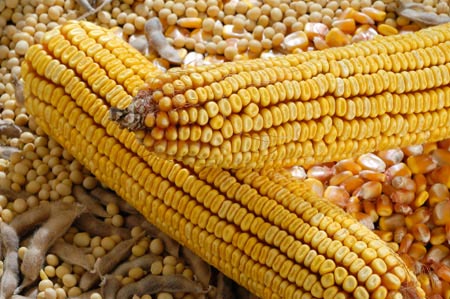 (Businessweek) – An eight-year surge in soybean imports by China, the biggest buyer, may come to an end this year as feed consumption drops following a bird-flu outbreak and the discovery of thousands of dead pigs floating in a river.
(Businessweek) – An eight-year surge in soybean imports by China, the biggest buyer, may come to an end this year as feed consumption drops following a bird-flu outbreak and the discovery of thousands of dead pigs floating in a river.
Imports, which more than tripled from 2004 to 59.2 million metric tons in the year to Sept. 30, will probably fall to 58 million tons this year, as consumers, wary of infectious diseases, shun poultry and pork, according to the median of a Bloomberg survey of four crushers and three analysts in China. Feed is mostly made with soybean meal and corn.
China’s 60 cases of H7N9 flu virus infections and 13 deaths are raising the specter of the 2003 global pandemic of severe acute respiratory syndrome that killed 774 people. Imports of soybeans plunged 21 percent in the 2003-2004 marketing year and an outbreak of H5N1 virus in 2006 also led to the slowest growth in shipments since the SARS outbreak.
“We believe this new avian flu will cut at least 500,000 tons of soybean-meal demand in the immediate future,” said Liu Xianwu, general manager at researcher China Cereals & Oils Business Net. “Soybeans will come down because at the current level, Chinese crushers don’t make money,” he said April 12.
Soybeans may drop to $13 a bushel in the next month, according to Beijing-based China Cereals. The May-delivery contract on the Chicago Board of Trade delivery fell 0.6 percent to $13.7075 a bushel at 12:31 p.m. in Beijing. Meal on the Dalian Commodity Exchange dropped 1.5 percent to 3,110 yuan ($503) a ton, near the lowest level in 13 months. It has lost 7.1 percent since March, when the outbreak was first reported.
Husbandry ‘Disasters’
“Disasters are hitting the animal husbandry one wave after another,” as even before the bird flu, consumers were leery of eating pork from the effect of the dead hogs incident in Shanghai, said Monica Tu, soybean analyst at Shanghai JC Intelligence Co. “It’s looking more likely we’ll have to keep cutting projection for this year’s imports,” she said.
Yum! Brands, Inc. said in a statement this week that the avian flu in China has had a “significant, negative impact on KFC sales.” Xiamen Airlines Co. has suspended serving chicken and duck because of passenger concerns.
Livestock and poultry producers are cutting inventories of feed as consumption of poultry, eggs and pork slumped, state-owned researcher grain.gov.cn, a unit of the China National Grain & Oils Information Center, said today adding that prices of corn have weakened across the country.
Egg Futures
The Dalian exchange today said an egg-futures trading system, which passed a test last week, is still under regulatory review. The contracts were set up to deal with outbreaks such as bird flu by placing delivery points in major producing and consuming regions and by allowing deliveries to be taken in uninfected regions, the statement cited an unidentified market participant as saying.
Authorities in Shanghai retrieved 11,040 dead pigs from Shanghai’s Huangpu river last month, with thousands more found in neighboring Zhejiang province. The environmental scare helped reduce the price of live hogs to the lowest in almost three years, causing “large losses” to the nation’s animal husbandry sector, Liu Yonghao, chairman of New Hope Liuhe Co., China’s biggest poultry supplier, said in Beijing on April 9.
The average price of live hogs traded in northern Shandong province declined to 12.20 yuan a kilogram on April 12, the lowest since July 2010, according to Shanghai JC data.
China used 45.2 million tons of soybean meal to feed animals in 2011-2012, according to Shanghai JC’s Tu. Hogs account for about half of the feed consumption, while the poultry and eggs sector took 40 percent, Tu said.
Total soybean imports in the first six months of the 2012-2013 marketing year fell 9.2 percent to 25.6 million tons, partly because of reduced output from the U.S. and a shipping bottleneck in Brazil, according to Liu of China Cereals.
While reduced imports have caused a shortage in the domestic market, crushers may be less willing to boost purchases for the remaining months given the falling demand, Liu said.




